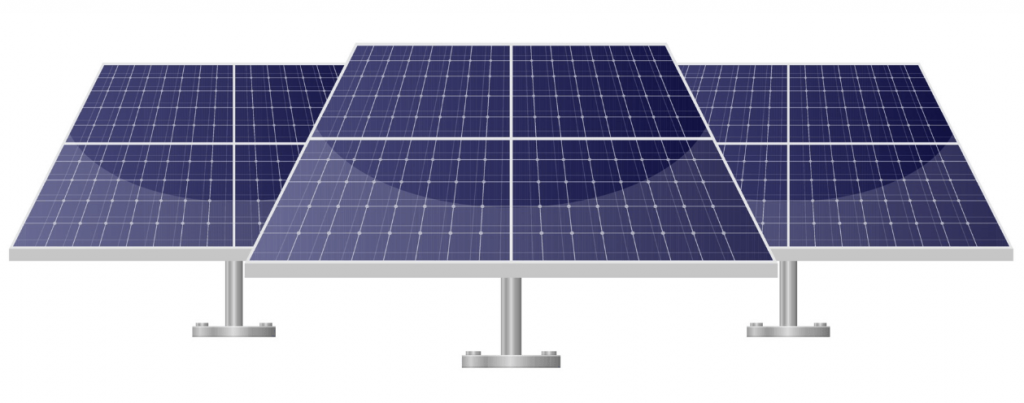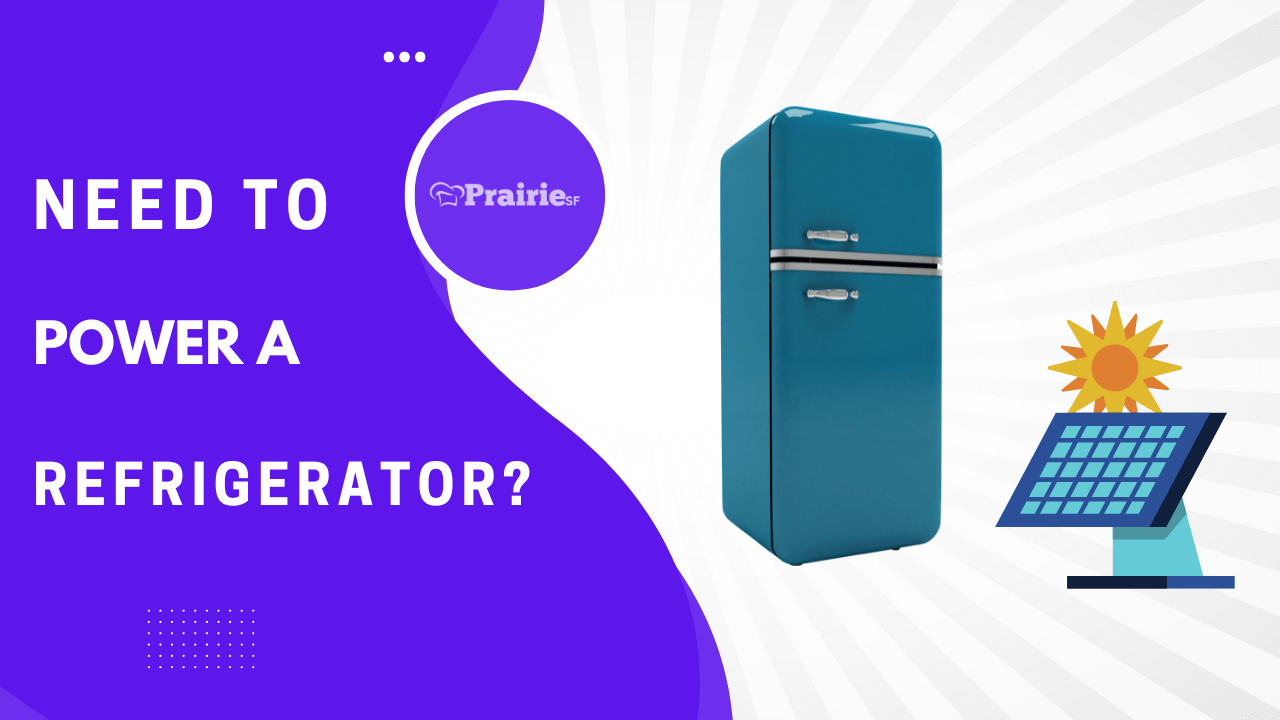Powering your home with solar energy is an increasingly ambitious goal, as you can now easily calculate how many Watts of energy your refrigerator requires. But don’t worry! This article will break down just how many solar panels you’ll need to get the power needed for a well-stocked refrigerator.

In this article, we will be taking a step-by-step look at the process of calculating the number of solar panels needed to power your appliances.
Contents
How To Calculate How Many Solar Panels You Need To Power Your Refrigerator?
There are many factors to consider when calculating the number of solar panels needed to power your home. To get the most accurate answer, you must consider the following factors:
-
The size of your refrigerator (length, height, width, and depth).
-
The type of insulation used in your home.
-
The amount of energy consumed by your appliances.
-
The amount of energy consumed by your appliances over a set period (e.g., per day or month).
-
The amount of sunlight that can be captured by your roof’s solar panels (which will vary depending on location, climate, and roofing type).
-
The amount of energy your solar panels can produce.
The best way to calculate how much energy you need to power your appliances is to get an energy consumption report of the appliance. This allows you to come up with a more accurate estimate. If this isn’t an option, the next best step is to use the rough estimates that are available on the internet. Luckily, there are already calculators on many websites which allow users to calculate how many solar panels they need based on information about their home, roof, and appliances.
Determine How Many Watts Your Solar Panels Produce?
It’s also possible to calculate the wattage of your solar panels from their output. The most popular solar panel is called a “tracker” after the name and design company that makes it. The official name for this panel is “solar frontier tracker”, manufactured in Japan by Panasonic.
To accurately determine your panels’ wattage, you’ll need your panels’ voltage and amps (Amps = Volts x Amps). Since solar power has no inherent power source, it must use some other type of energy to do its work – they are attached to something else, like its host panel or power grid.
Your solar panels will either have a DC voltage of 12V or anything from 24V to 48V. If you have a 28V panel, you’ll need at least (28 x .96) 23.6VDC to power your refrigerator. It’s possible to determine the volts and amps of your panels by reading the data plate on them. This plate is usually located between the two solar panel wires and is usually made of metal. Looking for something like “800mA” will indicate that that particular panel can output 800 mA at 12 volts DC – if it’s indicated with 600 mA, then it has an amp draw of 600ma at 12 volts DC.
This is the most accurate way to calculate the power output of your panels. And it’s worth it, as a grossly large solar panel array will never do you any good – and you’ll need to install more solar panels.
Total Watts Your Solar Panels Can Produce = Volts x Amps
Determine How Many Watts Your Refrigerator Uses?
The easiest way to get the wattage of your refrigerator is the number on the name plate located on the back of the appliance. It will say something like “240V 8.5A”. The 8.5A is the average power consumption for every hour it’s plugged in, and 240V is how many watts it uses when running at full capacity (the capacity specified by law). Measure the wattage of your refrigerator with a digital meter in daylight and take the reading of 240V x 8.5A.
Divide the Energy Used By The Energy Produced
Divide the energy esed by the refrigerator by the energy produced by the solar panels
The formula for this is: Watts Used / Watts Produced
Make sure you know how many solar panels you have, and it’s possible to calculate their wattage from the nameplate on the back of the panel. (It’s also possible to take a meter reading from the panel itself, but most panels are labeled inside and outside).
Once you have your figures, use the above formula to determine how many solar panels you need
Explanation:
Number of Solar Panels Needed = Watts Needed / (1 + .40) x Number of Solar Panels (This is for systems that produce a little bit more power than needed to run the refrigerator – 20% extra power above what’s used by the refrigerator).
In this example, we are using 20 VDC solar panels with an amp draw of 600ma in peak output. Our fridge consumes 800 W resulting in watts drawn of 2400 watts per day.
Number of Solar Panels Needed = 2400 / (1 + .40) x 2 = 20 solar panels
Note:
It’s possible for the energy consumed by your refrigerator to be less than the energy produced by your solar panels. If this is the case, it will automatically be reduced to 0, because solar panels are a power source that only produces energy at certain times of the day. You’ll also need to add in some extra equipment to handle this – like a battery backup system or a timer. This is an example only and does not account for additional equipment needed.
How Many Solar Panels Do I Need To Power A Full-sized Refrigerator?
A full-sized refrigerator uses an average of 1200 watts per day or a Peak of 1800 Watts. As a result, a typical 20 VDC solar panel has enough capacity to power a full-sized refrigerator.
However:
You’ll need much more watts to use a larger refrigerator, like an electric French Door or Wine-Fridge. The best way to find out how many solar panels are needed for these is to take a meter reading of your refrigerator, determine the watts it consumes on its highest usage day, and divide it by the watts it uses at the peak output (1800). Then multiply by the number of solar panels you have.
We determine how many solar panels are needed by:
Multiplying the number of watts used on the highest usage day (1800) by .96 – this is because 96% of the time a solar panel produces 96% of its peak output. This will account for almost all of your refrigerator’s energy needs, leaving 4% for electric backup for cloudy days, etc.
However, the amount of sunlight that a panel will receive during any given day depends on how much cloud cover there is as well as other factors. As such, you may need more or fewer panels than calculated above. The best way to determine how many panels you will need to power your solar refrigerator with solar energy is to measure both the number of hours the sun shines on your home each day for an entire year and the number of hours each day that it does not rain or overcast, which can also reduce sun exposure by 50% or more.
How Many Solar Panels Do I Need To Power A Small Refrigerator?
A Small Refrigerator uses approximately 150 watts (peak) at a time.
A typical 20 VDC Panel has enough capacity to power a small refrigerator for about 30 hours – about one and half days of usage.
Therefore: How many solar panels are needed for a small refrigerator?
Multiply the hours of usage by .96 – this is due to the high probability of overproduction.
(150 watts / .96) x 2
= 13.5 solar panels
Note: You can use these factors to determine how many solar panels are needed for all types of refrigerators, from small to large.
FAQs
Yes! In theory, you can run a 12-volt refrigerator from a solar panel. The key to running your fridge from solar is to correctly size both the panels and your battery, which means understanding how much power your fridge uses.
Possibly. A 100-watt solar panel is rated to power a refrigerator with a draw of about 12 Watts. This assumes that the panels are efficient and that your battery bank is large enough to provide the amount of power required for the refrigerator to operate.
Most people opt to run their refrigerator with a separate 12-volt solar panel. This is because the amount of power required to run the freezer compressor is typically significantly more than that required to keep the refrigerator cool. So, you will need a separate solar panel, and more than one, to power your entire refrigerator and freezer.
Conclusion
Everything you need to know about how many solar panels I need to power a refrigerator is listed above, the rest is up to you. If you want other appliances to run off of your solar panels, then adding a few more panels wouldn’t hurt. You’ll just want to ensure you have a quality battery and inverter system. If that’s not for you, stick with the abovementioned basics and enjoy your fresh food!

